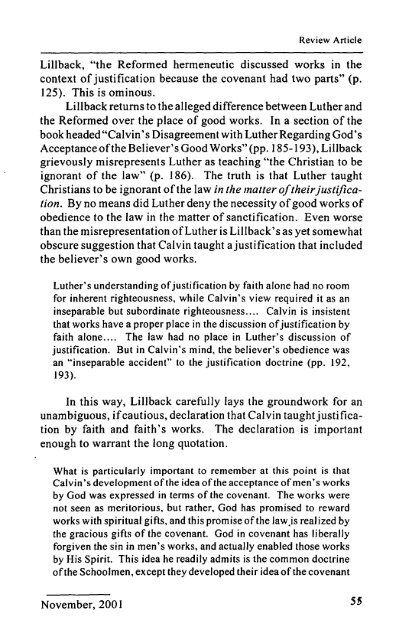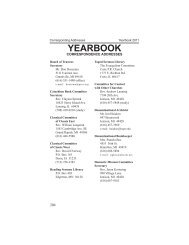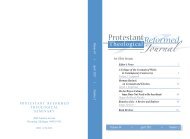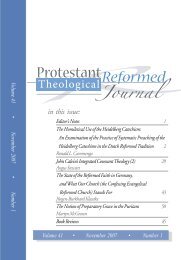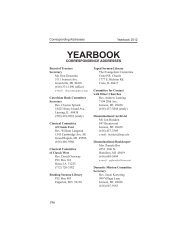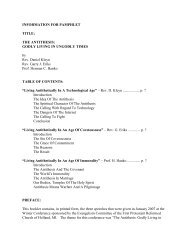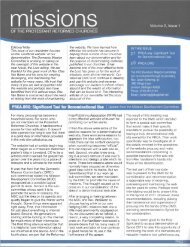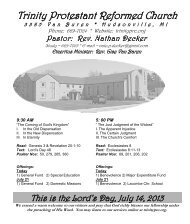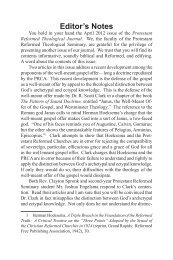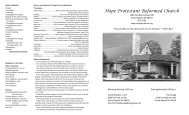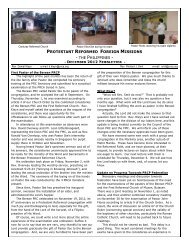pdf - Protestant Reformed Churches in America
pdf - Protestant Reformed Churches in America
pdf - Protestant Reformed Churches in America
Create successful ePaper yourself
Turn your PDF publications into a flip-book with our unique Google optimized e-Paper software.
Review ArticleLillback, Hthe <strong>Reformed</strong> hermeneutic discussed works <strong>in</strong> thecontext ofjustification because the covenant had two parts" (p.125). This is om<strong>in</strong>ous.Lillback returns to the alleged difference between Lutherandthe <strong>Reformed</strong> over the place of good works. In a section of thebook headed"Calv<strong>in</strong>'s Disagreement with LutherRegard<strong>in</strong>g God'sAcceptanceofthe Believer's Good Works" (pp. 185-193), Lillbackgrievously misrepresents Luther as teach<strong>in</strong>g "the Christian to beignorant of the law" (p. 186). The truth is that Luther taughtChristians to be ignorant ofthe law <strong>in</strong> the matteroftheirjust~fication.By no means did Luther deny the necessity ofgood works ofobedience to the law <strong>in</strong> the matter ofsanctification. Even worsethan the misrepresentation ofLuther is Lillback's as yet somewhatobscure suggestion that Calv<strong>in</strong> taught ajustification that <strong>in</strong>cludedthe believer's own good works.Luther's understand<strong>in</strong>g ofjustification by faith alone had no roomfor <strong>in</strong>herent righteousness, while Calv<strong>in</strong>'s view required it as an<strong>in</strong>separable but subord<strong>in</strong>ate righteousness.... Calv<strong>in</strong> is <strong>in</strong>sistentthat works have a proper place <strong>in</strong> the discussion ofjustification byfaith alone.... The law had no place <strong>in</strong> Luther's discussion ofjustification. But <strong>in</strong> Calv<strong>in</strong>'s m<strong>in</strong>d, the believer's obedience wasan "<strong>in</strong>separable accident" to the justification doctr<strong>in</strong>e (pp. 192,193).In this way, Lillback carefully lays the groundwork for anunambiguous, ifcautious, declaration that Calv<strong>in</strong> taughtjustificationby faith and faith's works. The declaration is importantenough to warrant the long quotation.What is particularly important to remember at this po<strong>in</strong>t is thatCalv<strong>in</strong>'s development ofthe idea ofthe acceptance ofmen's worksby God was expressed <strong>in</strong> terms of the covenant. The works werenot seen as meritorious, but rather, God has promised to rewardworks with spiritual gifts, and this promise ofthe law)s realized bythe gracious gifts of the covenant. God <strong>in</strong> covenant has liberallyforgiven the s<strong>in</strong> <strong>in</strong> men's works, and actually enabled those worksby His Spirit. This idea he readily admits is the common doctr<strong>in</strong>eofthe Schoolmen, except they developed their ideaofthe covenantNovember, 2001


